
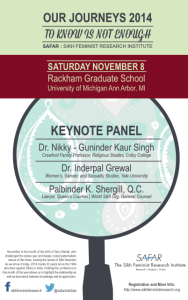 Guest post by Sarina Kaur
Guest post by Sarina Kaur
“A Sikh’s entire life is life of benevolent exertion”. Sikh Rehat Maryada (Code of Conduct)
Benevolent exertion. These powerful words along with countless examples from history, gurbani, and rehat remind us that to question, challenge, and think for the purpose of informing our actions according to the Guru’s teachings is a Sikh’s birthright, privilege, and responsibility. This benevolent exertion toward an egalitarian world and empowered society devoid of oppression is a standard rooted in our collective psyche. But to know this, is not enough. The first Sikh Feminist Conference in North America, by SAFAR: the Sikh Feminist Research Institute, seeks to unpack what this means for Sikhs of the 21st century.
Personally, at every turn in my own journey toward creating a life imbibed with thoughtful action toward a more just and humane world, I have craved to understand and experience the unspoken viewpoints of the Kaur experience. Today, few can deny that no matter where you look- within the Sikh social context or in the global context-the dominant narrative is not inclusive of the female voice; that our calibrated center-where we collide as a society-is not in line with the standards our Guru’s introduced. A space for expansive revival, attention, voice and praxis to the feminist values and egalitarian politics inherent within Sikhi is a step toward a more calibrated center.[1] SAFAR’s Conference Program promises such progressive steps.
Distinguished keynote panelists, Dr. Nikky-Gurinder Kaur Singh, Dr. Inderpal Grewal, and Palbinder K. Shergill will launch the discussions and introspections for the day while exploring the topic “What Do We Know?” By exploring what knowledge exists from various sources, this panel promises to dive into an exploration of the intersectionality of Sikhi, feminism and discourse on Sikh Feminism. Each of the panelists is a pioneer in her own right; while Dr. Singh is often fondly thought of as the mother of ‘Sikh feminism’, Dr. Grewal from Yale is lauded for her seminal work on ‘transnational feminism,’ while Ms. Shergill is a trailblazer in the courtrooms in Canada, and just recently distinguished herself as the only female lawyer in the Supreme Court, that too while articulating the fundamentals of religious freedom in a case about the religious freedoms for a non-Sikh-Sikhi in action! I look forward to their discourse and interaction with each other as moderated by writer and activist, Inni Kaur.
Guest blogged by Manpreet Kaur
Recently the Sikh American Legal Defense and Education Fund (SALDEF) announced that they will be honoring Gap, Inc. for taking “pride 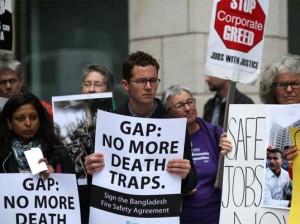 in featuring the Sikh American identity†at their annual gala on October 11th in Washington, DC. As you may remember, last year, the Gap used Sikh actor and designer Waris Ahluwalia in their “Make Love†campaign. The Sikh community gave a lot of praise to Gap over social media posting and re-posting the advertisement as even encouraging Sikhs to purchase from and support the company. This support increased exponentially when Gap responded positively to racist vandalism on an ad in New York City.
in featuring the Sikh American identity†at their annual gala on October 11th in Washington, DC. As you may remember, last year, the Gap used Sikh actor and designer Waris Ahluwalia in their “Make Love†campaign. The Sikh community gave a lot of praise to Gap over social media posting and re-posting the advertisement as even encouraging Sikhs to purchase from and support the company. This support increased exponentially when Gap responded positively to racist vandalism on an ad in New York City.
While having a Sikh model on a mainstream advertisement might be a positive step especially a year after the Oak Creek tragedy, as Sikhs, how can we, as a community, support a company that has carried out horrific labor practices? Gap’s terrible labor practices in South Asian countries have been widely documented, putting employees in extremely dangerous working conditions with less than minimum compensation.
Gap, Inc. literally has blood on its hands, as 29 trapped garment workers died in a fire in a Bangladesh factory that produced clothing for the company in 2010. United Students Against Sweatshops states:
Human rights activists and labor groups have been calling on Gap to fix the factories in the rest of their Bangladesh supply chain since December 2010, but instead Gap is sticking with its own corporate-controlled voluntary initiative that lacks transparency, accountability, and worker voice. Gap initially promised to sign onto a meaningful fire and building safety agreement, but then backed out, announcing their own, go-it-alone initiative. Gap is using the same self-regulatory approach that they and other brands have used for two decades and that has failed to protect the safety of workers in Bangladesh: factory monitoring controlled entirely by Gap, with no transparency, no role for workers or their trade unions, no commitment to pay prices to suppliers that make it feasible for them operate responsibly, and no binding commitments of any kind.
Guest blogged by Bandana Kaur
“Pavan guru paanee pitaa
Maataa dharat mahat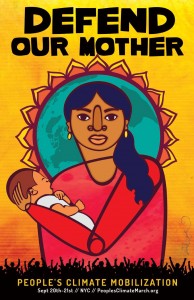
Divas raat du-i daa-ee daayaa
Khaylai sagal jagat”
-Guru Nanak SahibÂ
In honor of the Sikh concern for preserving ‘Mata Dharat’ (Mother Earth), Sikhs from cities across the northeast are joining the People’s Climate March in New York City on September 21st, the largest mass movement for climate justice in history.
Next week, world leaders are coming to New York City for a UN summit on the climate crisis. The world is urging governments to support an ambitious global agreement to dramatically reduce global warming pollution.
With our future on the line and the whole world watching, we’ll take a stand to bend the course of history. We’ll take to the streets to demand the world we know is within our reach: a world with an economy that works for people and the planet; a world safe from the ravages of climate change; a world with good jobs, clean air and water, and healthy communities.
Why Are We Marching?
We march because Sikhi affirms the sanctity of the Earth.
We march because the ecological basis of Sikhi rests in the understanding that the Creator (‘Qadir’) and the Creation (‘Qudrat’) are One. The Divine permeates all life, and is inherent in the manifest creation around us, from the wind that blows across land and skies, to the water that flows through rivers and seas, to the forests and fields and all creatures of land and sea that depend on the earth for sustenance.
We march because Sikh Gurus teach that there is no duality between the force which makes a flower grow and the petals we are able to touch and sense with our fingers.
We march because the Sikh Gurus referred to the Earth as a ‘Dharamsaal,’ a place where union with the Divine is attained. Guru Nanak describes this in Jap Sahib, that amid the rhythms of Creation, the changing seasons, air, and water, the Creator established the earth as the home for humans to realize their Divinity in this world.
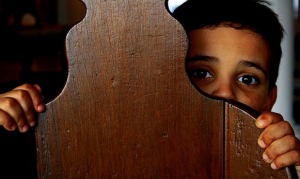 Guestblogged by Daler Singh
Guestblogged by Daler Singh
Warning: This post contains graphic depictions of sexualized violence.
I was about 7 years old when a respected granthi and my dad’s friend sexually molested me. I would spend much of my afternoons and evenings at the gurdwara. My father is a devout Sikh and made sure he went at least once a day after work to visit, but Sundays were the days I remember my entire day could be spent at our local Gurdwara.  One evening, while divan was occurring, I went to go play hide-and-seek with my friends. During one of these games, I ran past a van that was parked on the premises of the gurdwara. It was brown and I remember there were curtains in the van. The door slid open and a young boy, a little older than me, climbed out. He immediately called over to me and asked me to come look inside the van, so I did.

A rally in Brooklyn, NY in support of the BDS movement on Monday.
Monday evening in Brooklyn, about 50 people gathered to protest Israeli apartheid and encourage the boycott of Israeli goods, a part of the growing boycott, divestment, and sanctions (BDS) movement. Inspired by the effective use of boycott and divestment tactics in the struggle against South African apartheid decades ago, the BDS movement is growing with recent victories such as the Presbyterian Church (USA) and many colleges and universities deciding to stop investing in companies complicit in the oppression of the Palestinian people.
The mood of Monday’s rally was heavy. What was intended to be a celebration of the 10th anniversary of the BDS movement instead was a mourning of the many Palestinian lives taken in recent days by Israeli soldiers/bombs and civilians/settlers alike. Like Muhammad Abu Kheidr, a 16-year-old who was burned alive last week in what is widely assumed to be a revenge lynching by Israeli settlers after the bodies of three missing Israeli teens were discovered (blamed on Hamas without any evidence). Or Muhammad’s cousin Tareq, a 15-year-old Palestinian American who was badly beaten and detained for being at the wrong place at the wrong time (with the wrong ethnicity) a few days later. Or the 31 people in Gaza killed and countless others injured and displaced by 378 Israeli airstrikes in the last two days of its increasingly devastating “Operation Protective Edge.” Or the 10+ killed and over 360 kidnapped in Israel’s “Operation Brother’s Keeper” a few weeks ago in the West Bank, a form of collective punishment on the entire population after the  disappearance of three Israeli boys.
This past weekend was pride weekend in my home of New York City and many other cities around the country and world. I missed many of the festivities because I was traveling but did attend the annual Trans Day of Action last Friday, a march a rally organized by the Audre Lorde Project and many other groups on the historic Christopher Street Pier. It was a beautiful gathering of a very diverse and energetic group of queer people, trans people, and allies. The event was largely led by LGBT (lesbian, gay, bisexual, and transgender) people of color and immigrants, a breath of fresh air given how these individuals are so often invisible/marginalized/excluded in both the mainstream gay movement and in their own communities and families.
Towards the end of the rally, a young desi man came up to me, introduced himself, and asked me about local Sikh activist groups to get involved in. He, like so many others in our community, has not found a Sikh space where he can take action on the various social justice issues he is passionate about — including LGBT rights and justice. We had a nice, short conversation about the activist roots of Sikhi and our Gurus’ radical commitment to equality and liberation. Yet we are all too aware of the rampant homophobia in our community, which I have written about before.
Given this reality, I was happy to see a PSA circulating in the last few days that features a Sikh family speaking out against homophobia. We could certainly use one in Punjabi to reach more members of our community, but this Hindi video is a great start nevertheless.
4) PSA Hindi from Asian Pride Project on Vimeo.
When most of us imagine what the people inside immigration detention centers in the United States look like, we usually do not  think of Sikhs from Punjab. Our Sikh American community — and more broadly South Asian American community — has been reluctant to deeply engage with the harsh realities of immigration policy and detention here in the United States. Too often we have seen this as someone else’s issue or passed quick judgment on those migrants from various parts of the world who overstayed their tourist visas or crossed the border under the radar — in search of work, to feed their families, in hopes of a better life. Papers or not, this hope for freedom is what brings all migrants to the United States.
think of Sikhs from Punjab. Our Sikh American community — and more broadly South Asian American community — has been reluctant to deeply engage with the harsh realities of immigration policy and detention here in the United States. Too often we have seen this as someone else’s issue or passed quick judgment on those migrants from various parts of the world who overstayed their tourist visas or crossed the border under the radar — in search of work, to feed their families, in hopes of a better life. Papers or not, this hope for freedom is what brings all migrants to the United States.
Right now at least 37 Punjabi migrants, who fled India in search of this illusive freedom, are detained in an Immigration and Customs Enforcement (ICE) detention center in El Paso, Texas. News of these men and others at the El Paso facility protesting their indefinite detentions (they have been detained for over nine months now) came to surface in December. Last week, we learned that 37 Singhs — now known as the El Paso 37 — began a hunger strike.Â
37 young Sikh men — many who are seeking political asylum in the US — have been detained for almost a year in Texas, yet we have heard almost nothing about it in our organizations or gurdwaras. There has been no major news coverage of these men’s plight. Their harsh journey to El Paso reportedly took them through Moscow, Havana, Ecuador, El Salvador, Guatemala, and Mexico. Instead of finding respite, comfort, and safety in the US, they have found prison walls.
For a long time, it was a distant dream that the Sikh community would create institutional power in the form of Sikh organizations. Having been in America for over 100 years now, we finally are in a place where professional organizations exist in parallel to our Gurdwaras. Now, young Sikhs graduating from college or beginning their professional careers can join organizations representing the Sikh voice as full-time employees (and often, even with benefits!).
Below is a list of organizations that are looking for qualified candidates! Note: Please contact the organizations directly to confirm whether these jobs are still available.
Dasvandh Network – Associate Director, Summer Intern [learn more]
The goal of the Dasvandh Network is to bring Sikh and community giving to the next level. The progress of our community remains stunted due to the lack of consistent funds available to both established organizations and community projects. We must reignite the spirit of Dasvandh and promote humanitarian ideals by supporting innovative projects & organizations.
Seva Food Bank (Canada) – Volunteer & Staff Engagement Coordinator [learn more]
Act on the basic Sikh tenets of sarbat da bhalla (the well-being of all) and seva (selfless service) to provide a sustained supply of safe, nutritious and culturally-appropriate food available for distribution to low-income families.
Sikh Research Institute – Research Assistant/Content Developer [learn more]
The Sikh Research Institute aims to develop a principle-driven community by protecting the core and enlarging the resource pool. Our efforts are divided into three focus areas: Training and Development, Global Awareness, and Strategic Solutions.
The Sikh Coalition – Community Development Manager, Media Associate, Summer Interns [learn more]
The Sikh Coalition is a community-based organization that works towards the realization of civil and human rights for all people. In particular, we work towards a world where Sikhs may freely practice and enjoy their faith while fostering strong relations with their local community wherever they may be.
Ensaaf – Office Manager [learn more]
Ensaaf is a nonprofit organization working to end impunity and achieve justice for mass state crimes in India, with a focus on Punjab, by documenting abuses, bringing perpetrators to justice, and organizing survivors.
Fateh!
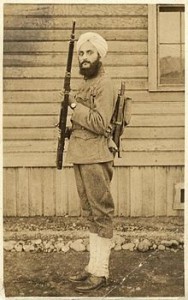 Yesterday, the Washington Post reported that a bipartisan group of 105 Members of Congress sent a letter urging the Department of Defense to end a presumptive ban on devout Sikhs who want to serve in the U.S. Armed Forces.  Over the past several years, civil rights group, The Sikh Coalition, has been working to address the issue of equal opportunity in the Armed Forces allowing all Sikhs to serve.  Since 2009, three Sikh Coalition clients—Major Kamaljeet Singh Kalsi, Captain Tejdeep Singh Rattan, and Corporal Simran Preet Singh Lamba—have received rare and historic accommodations to serve in the U.S. Army with their articles of faith intact.  A timeline of the efforts can be found here.
Yesterday, the Washington Post reported that a bipartisan group of 105 Members of Congress sent a letter urging the Department of Defense to end a presumptive ban on devout Sikhs who want to serve in the U.S. Armed Forces.  Over the past several years, civil rights group, The Sikh Coalition, has been working to address the issue of equal opportunity in the Armed Forces allowing all Sikhs to serve.  Since 2009, three Sikh Coalition clients—Major Kamaljeet Singh Kalsi, Captain Tejdeep Singh Rattan, and Corporal Simran Preet Singh Lamba—have received rare and historic accommodations to serve in the U.S. Army with their articles of faith intact.  A timeline of the efforts can be found here.
The Members wrote:
Dear Secretary Hagel,
We respectfully request that the United States Armed Forces modernize their appearance regulations so that patriotic Sikh Americans can serve the country they love while abiding by their articles of faith.
Devout Sikhs have served in the U.S. Army since World War I, and they are presumptively permitted to serve in the armed forces of Canada, India and the United Kingdom, among others. Notably, the current Chief of Staff of the Indian Army is a turbaned and bearded Sikh, even though Sikhs constitute less than two percent of India’s population. Throughout the world, and now in the U.S. Army, Sikh soldiers are clearly able to maintain their religious commitments while serving capably and honorably.
After hearing from their constituents, many Members of Congress who represent large constituencies of Sikhs signed onto this letter representing the importance and value of political engagement. Â Unfortunately, there were also Members of Congress – some who represent Sikh constituents, who fund-raise within the Sikh community and even sit on the American Sikh Congressional Caucus who did not sign this letter. Â This includes my own Member of Congress, Devin Nunes who “represents” (or that’s what we thought) a large constituency of Sikhs in the Central Valley of California. Â Other missing signatories include Congressman LaMalfa and McClintock – who, in the past, have reached out to the Sikh community for support.
It isn’t enough to simply invite Members to our Gurdwaras and offer them saropay. Â We have to hold our Members of Congress accountable once they leave our Gurdwaras and are challenged to support our issues on the Hill. Â Our presence and political engagement will only make a difference when we continue to take a leadership role to address inequity in our society and establish a strong voice on behalf of the Sikh community.
Co-blogged by American Turban and Sundari

San Quentin State Prison, California. (Image: San Quentin News.)
The Sikh Coalition, a civil rights organization, was recently asked to present to a group of inmates at San Quentin State Prison in Northern California.  Organized by the Asian Prisoner Support Committee, which has a weekly class inside San Quentin State Prison called SQ ROOTS (Restoring Our Original True Selves), the organization was asked to make a presentation about the Sikh community.  The class is modeled after Asian American Studies courses, covering topics such as history, culture, personal experiences as well as health and reentry issues.  The class is comprised of Vietnamese, Filipino, Cambodian, Hmong, Lao, Chinese, Mexican in addition to Punjabi Sikh men.
The presentation included a Sikh awareness talk followed by a discussion on the post-9/11 challenges experienced by the Sikh community, including hate crimes, school bullying, religious profiling and workplace discrimination.  It was a unique experience for both the Sikh Coalition volunteers as well as the inmates who noted at the end that they were “grateful†and “thankful†to have learned about the Sikh community and the issues that Sikh Americans were experiencing.  It was a moving experience and pushed us to think about restorative justice and the role of forgiveness within Sikhi.
Many of us on the “outside†have preconceived ideas about what life is like inside the prison system. To be sure, our few hours inside the prison and interacting with the inmates may not be a fully representative view of prison life. Yet, the warm reception we received by inmates before, during, and after our session was eye-opening; the inmates in our class were very engaged, courteous and collegial. We enjoyed the positive and warm atmosphere exuded by each member of our audience, and were touched by the obvious desire by these inmates to learn more about the Sikh community, and to even empathize with some of the issues that Sikhs in this country have faced.
A few weeks ago, the Indian Supreme Court re-criminalized sexual acts between consenting adults of the same sex. The Supreme Court  overturned a 2009 decision by the Delhi High Court to strike down section 377 of the Indian Penal Code, which came directly from a British colonial law from 1861. Section 377, which was just reinstated, states:
overturned a 2009 decision by the Delhi High Court to strike down section 377 of the Indian Penal Code, which came directly from a British colonial law from 1861. Section 377, which was just reinstated, states:
377. Unnatural offenses — Whoever voluntarily has carnal intercourse against the order of nature with any man, woman or animal, shall be punished with imprisonment for life, or with imprisonment of either description for a term which may extend to ten years, and shall also be liable to fine.
As Prerna Lal states about the recent ruling, “the Indian Supreme Court has re-criminalized gay sex in India, rendering almost 20 percent of the global LGBT population illegal.” As a result, LGBT Indians and their allies in India and around the world have taken to the streets, signed petitions, and engaged in creative actions through social media, showing their outrage about this backwards decision.
But what has the Sikh response been? I have previously written about the homophobia rampant in our community and how ironic it is, given our Gurus’ deep commitment to equality and social justice. In the days after the ruling on 377, I wondered if any Sikh activists committed to LGBT equality would come out of the woodwork. I also wondered about the Sikh response to the ruling in India and if any Sikh institutions publicly supported or lobbied for this ruling. Embarrassingly, Sikh institutions have publicly campaigned against LGBT equality in the past, including supporting the Defense of Marriage Act (DOMA) in the US a few years back.
Enter Kanwar Saini, aka Sikh Knowledge, a young, openly gay hip hop artist in Toronto. In protest of 377 and as a part of a social media campaign, Saini posted a photograph of him kissing another man on Facebook, which went somewhat viral and led to a lot of discussion and debate about Sikhi and gay rights. Facebook removed the photo from his page for 16 hours, quite possibly due to a whole lot of homophobic Sikhs reporting the picture to Facebook as offensive.
Saini recently appeared on CTV discussing the incident and his response.
The Best:
-
Bhai Gurbaksh Singh went on a hunger strike for 44 days which led to the release of 4 political prisoners and increased international attention on human rights in India. We were all deeply moved and inspired, and Bhai Sahib sparked a new movement!
-
Sikh women claimed their place in new and outstanding ways!
-
Balpreet Kaur gave this inspiring talk. We all love her.
-
SAFAR held it’s second annual Young Women’s Leadership conference, took us beyond International Women’s Day and shared a beautiful message on the International Day of the Girl.
-
The Sikh Coalition acknowledged International Day of the Girl for the first time.
-
The Sikh Activist Network featured poems about rape in India.
-
Sikhnet hosted an online youth film festival focused on KAUR. How amazing is that?!
-
The Sikh Art & Film Festival added a female speaker to their panel and 18MillionRising stepped in to support gender equality.
-
My awesome friends are building a Dastaar Tutorial Project for women (more details to come soon). Maybe now I can figure out how to keep a patka on my head that doesn’t slip off underneath my dastaar. Win!!!!!
-
-
We marked the one-year anniversary since Oak Creek and grieved several other hate crimes but still came out on top.
-
Piara Singh was attacked in Fresno and the community rose to the occasion in inspiring ways, serving meals and buckets full of compassion to local families.
-
Dr. Prabhjot Singh invited his attackers to worship with him and shifted the narrative of justice when it comes to hate crimes.
-
The Sikh Coalition released a new version of Fly Rights. Rockin it!
-
Jasjeet Singh spoke at the 50th Anniversary of the March on Washington. No big deal.
-
Dr. Kiran Arora began a study on religion and race-related stress among North American Sikhs. Much-needed.
-
Turban Myths was released, the first national public perception assessment on the Sikh American community, conducted by SALDEF in collaboration with Stanford University. Nicely done! Continue Reading »
-
Guest blogged by Kirpa Kaur
A few weeks ago, India joined the world in mourning the loss of Nelson Mandela, the former South African president and anti-apartheid revolutionary whose armed resistance and leadership rendered him a “terrorist†and imprisoned for 27 years. Prime Minister Manmohan Singh stated: “A giant among men has passed away. This is as much India’s loss as South Africa’s. He was a true Gandhian. His life and work will remain a source of eternal inspiration for generations to come.â€
It’s been 44 days since a Sikh farmer and activist from Haryana decided to launch a hunger strike unto death at Gurudwara Amb Sahib (Mohali, next door to Chandigarh) to protest the long sentences being served by political prisoners who have been denied any legally mandated review of their cases; and India remains largely silent. BBC Radio yesterday recognized that while the protest has caught momentum around the world, and from various quarters in Punjab, including the oft-vilified Punjabi singers, mainstream India is largely aloof on this issue.
BREAKING NEWS: The Sikh Art and Film Foundation has responded by including a female speaker in next week’s Leadership Summit!!! Great progress. Â Yet, the lack of representation of women and girls from 2004 – 2012 in the film festivals and galas still needs to be addressed, and this is a community wide issue. Â See below for actionable solutions.
Via Email:
November 15, 2013 7:43PM Nina Chanpreet Kaur,
Dear Sikh Art and Film Foundation,
I am very glad to see that Rashmy Chatterjee will be speaking at next Friday’s Leadership Summit.  This is a tremendous gain for our community as most of the speakers at the summit have been men since 2011.  This represents a trend in many Sikh organizations I hope we can change together. As a Sikh woman and resident of NYC for the last 11 years, I have followed your organization since it’s inception.  Over the years, I have attended many of your events and have been so inspired by the films, speakers and attendees.  I have also noticed the lack of representation of women and girls in your programs.  Though you took a step forward this week, I believe you could be doing more to address, highlight and celebrate the challenges and triumphs of Sikh women and girls whether in your Film Festival, Heritage Gala or Leadership Summit.
I understand that your goal is to transcend the dichotomies and binaries of gender and other categories to sustain the universality and equality that our Gurus envisioned in order to promote and preserve Sikh and Punjabi heritage. Â I share your vision and do not condone a gender binary or bias towards either men or women. Â I am also aware that you face limitations as all organizations do, in particular that you must base the selections of films on the submissions you receive. Â However, Sikh men and boys have been a central part of your programs in a way Sikh women and girls have not and this indicates a bias – whether intentional or not.
From 2007 to 2012, none of your Gala awards for Leadership and Vision have been presented to Sikh women. Â In fact, the only women who received awards were for Creativity/Art with the exception of Shonali Bose who received an award for Courage and Shelley Rubin who received an award for Leadership jointly with her husband. Â For 5 years in a row you have only presented Sikh women with awards for Creativity/Art and no other category. Â As a Sikh woman, this sends a message to me and the next generation of Kaurs that women can be honored for creativity and art but not for leadership and vision. Â It raises questions about your beliefs and assumptions related to gender roles and women’s capacities in relation to men. Â This is most certainly not the message young Kaurs should be receiving, nor do I think this is your intention based on the email I received from Ravi last week. Â Â Â Â Continue Reading »
 There are only a few days left in the annual SikhNet Youth Online Film Festival. Â This year’s theme, “onKaur: Focusing the Lens on Women”, brings together a collection of 18 films by and about Sikh women. Â The films look at the idea of “Kaur”, what that means and how it can be represented in film.
There are only a few days left in the annual SikhNet Youth Online Film Festival. Â This year’s theme, “onKaur: Focusing the Lens on Women”, brings together a collection of 18 films by and about Sikh women. Â The films look at the idea of “Kaur”, what that means and how it can be represented in film.
The films have been categorized as documentary (“think”) and drama (“cry”) with issues including: Anand Karaj, bullying, hair, health issues of Panjab, gender justice, family, and gatka among others.
The film festival is important for several reasons and this year’s theme brings to light the need to include Sikh women’s voices in conversations around identity and community. Â It’s a valuable way of showcasing issues affecting Sikh women.
Here’s how to view and vote:
The film festival also provides a platform for young filmmakers to showcase their films to a wider audience.
1. View the documentary films here and vote via Facebook.
2. View the drama films here and vote via Facebook.
Voting ends on October 9th.
Guest Blogged by Jaideep Singh
As the Sikh American community embarks yet another mobilization against hate attacks— since this latest episode of violence has really hit home with many Sikhs in a way rarely seen since Balbir Singh Sodhi— we would do well to first answer the difficult, necessarily critical questions posed by my sister Nina Chanpreet Kaur in her thoughtful, passionate piece from last year.[1]
Our efforts at “education and outreach†clearly have yielded perilously little success— as measured by the safety of our communities. So education obviously is NOT enough. Reality is far more complex and ugly. A person who would attack a gurdwara is not coming to an open house or community feeding (langar) to abate their hatred. The long list of those in our communities who have been injured and killed, and the homes and gurdwaras defaced, testifies to as much. We cannot advance by hiding in our gated communities, far from the raw racial realities daily faced by our less fortunate sisters and brothers.
Fighting centuries of entrenched, utterly irrational white [and Christian] supremacy is neither an easy task, nor a short term one. Many of us cannot even bring ourselves to admit these forces even exist, let alone how they permanently define Sikhs as racial and religious outsiders. That naïve approach must end, replaced by a sophistication borne of serious historical study of U.S. history.
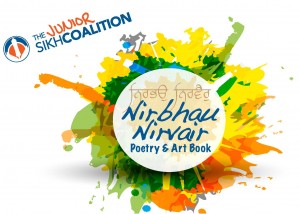 The Junior Sikh Coalition is an initiative of the Sikh Coalition to help develop leaders in local communities, providing young Sikhs with experience in organizing, advocacy, diversity education and civil rights.
The Junior Sikh Coalition is an initiative of the Sikh Coalition to help develop leaders in local communities, providing young Sikhs with experience in organizing, advocacy, diversity education and civil rights.
In a new project, the Junior Sikh Coalition is harnessing the power of art in advocacy with an unprecedented art collection called the Nirbhau Nirvair Poetry & Art Book to bring attention to issues such as bullying and hate crimes. Young Sikhs across to country are invited to submit their art, poetry, and photographs, to showcase their perspective on the concept of Nirbhau Nirvair (“without fear and without hatred”), as first proclaimed by Guru Nanak in Jap Ji Sahib.
Find out more below about this unique opportunity for young Sikh artists.
I’ve been invited to and participated in a number of interfaith gatherings, conferences, retreats, and discussions over the years. Time and time again I find myself being the only Sikh in these spaces. And often find that the well-meaning, progressive faith-based activists in these spaces don’t know other Sikhs besides me nor do they know much about Sikhi. So then it was refreshing to hear about the 2030 Faith in America Challenge, an interfaith gathering to strategize around creating a more just society, from a Sikh friend who is helping organize it. On October 6-7, the Nathan Cummings Foundation will host leaders in the 20s and 30s for a retreat in upstate New York to explore important and urgent questions around religious diversity. The application deadline is Monday, July 15th! Check it out and consider applying. Sikh voices are greatly needed in this discussion.
More information follows, and visit the website here.
In a rapidly changing world, where faith is as often a force for inspiration as well as polarization, how might we as people of faith, support individuals and communities connected to their religious and spiritual identities, to amplify their voice, vision and public leadership?
Is this a challenge that resonates with you or keeps you up at night? Would you invest four days of your life to wrestle with this challenge with a diverse group of leaders?
If yes, we invite you to complete an application to join us for the 2030 Faith in America Challenge gathering application due on by Monday, July 15, 2013. If selected, travel, food and lodging will be covered by the Nathan Cummings Foundation. Below you will find the articulation of the broader context in which we are locating this challenge, our belief in the importance of a strong religious and spiritual voice in the public arena, information about outcomes, methodology, profiles of potential participants, and a Frequently Asked Questions section.
Please review the required preparation and questions and please submit the completed application online by 11:59pm EST on Monday, July 15, 2013. Please send questions to 2030Challenge_FIA@nathancummings.org.
University of Massachusetts – Boston
Department of Counseling and School Psychology
100 Morrissey Blvd, Boston, MA 02125-3393
University of Massachusetts Boston
Researcher: Dr. Kiran S. K. Arora
Study: Religious Discrimination and Race-Related Stress among North American Sikhs.
We are interested in conducting research with Sikhs living in North America. The purpose of the study is to examine how experiences of religious discrimination and race-related stress may impact the relationships, mental health, and overall well-being of Sikhs. To gather this information, we are looking for individuals over the age of 18, who self-identify as Sikh, and are living in North America, to complete a set of anonymous questionnaires online.
This study hopes to contribute to a dearth of academic literature on Sikhs and their families. Your contribution is valuable, as it would provide insight for family therapists and other mental health professionals working with Sikh families. Your participation is strictly voluntary. Confidentiality is of utmost importance, and measures will be taken to protect your identity.
The purpose of this announcement is to alert you to the research project and invite you to ask any questions you may have about this project. You may contact Dr. Kiran S. K. Arora at Kiran.Arora@umb.edu if you are interested in participating, or learning more about the study. To learn more about the study or participate, you may also go to https://www.psychdata.com/s.asp?SID=153728.
Guest blogged by Mewa Singh
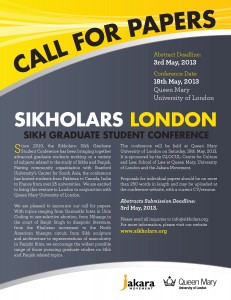 Earlier this year the Center for South Asia at Stanford University along with the Jakara Movement hosted its 4th annual Sikholars Conference (see the recap here). Â This successful endeavor bringing the latest academic research with an engaged community audience allows for fruitful discussion and exchange. Â Not limiting this event only to California, Sikholars conferences and workshops have been previously held in British Columbia, Canada and now in London, UK. Â Teaming up with Queen Mary College, University of London and Singh Sabha Southall, the Jakara Movement is proud to present Sikholars London.
Earlier this year the Center for South Asia at Stanford University along with the Jakara Movement hosted its 4th annual Sikholars Conference (see the recap here). Â This successful endeavor bringing the latest academic research with an engaged community audience allows for fruitful discussion and exchange. Â Not limiting this event only to California, Sikholars conferences and workshops have been previously held in British Columbia, Canada and now in London, UK. Â Teaming up with Queen Mary College, University of London and Singh Sabha Southall, the Jakara Movement is proud to present Sikholars London.
For those in the UK (looking at you @Blighty), hope you get to check it out and experience Sikholars – London. Â For more information visit their website here.
